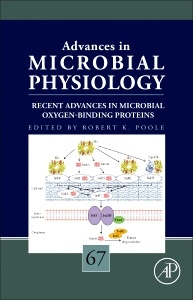Description
Recent Advances in Microbial Oxygen-Binding Proteins
Director of collection: Poole Robert K.
Language: English
Subjects for Recent Advances in Microbial Oxygen-Binding Proteins:
Keywords
Cytochromes; Bacterial; Microbial; haemoglobins; Guanylate cyclase
Publication date: 11-2015
Support: Print on demand
Support: Print on demand
Description
/li>Contents
/li>Biography
/li>Comment
/li>
This latest volume in Advances in Microbial Physiology continues the long tradition of topical and important reviews in microbiology.
- Cytochromes c': Structure, Reactivity and Relevance to Heme-Based Gas Sensing
Michael A. Hough and Colin R. Andrew - Bridging Theory and Experiment to Address Structural Properties of Truncated Hemoglobins: Insights from Thermobifida fusca HbO
Barry D. Howes, Leonardo Boechi, Alberto Boffi, Dario E. Estrin and Giulietta Smulevich - Structural Biology of Bacterial Haemophores
Paolo Ascenzi, Alessandra di Masi, Loris Leboffe,Emanuela Frangipani, Marco Nardini, Cinzia Verde and Paolo Visca - The Hemoglobins of Algae
Eric A. Johnson and Juliette T.J. Lecomte - The Challenging World of Biofilm Physiology
Joke Donné and Sylvia Dewilde - Avoid Excessive Oxygen Levels in Experiments with Organisms, Tissues and Cells
David Lloyd and Catrin F. Williams
Professor Robert Poole is West Riding Professor of Microbiology at the University of Sheffield. He has >35 years’ experience of bacterial physiology and bioenergetics, in particular O2-, CO- and NO-reactive proteins, and has published >300 papers (h=48, 2013). He was Chairman of the Plant and Microbial Sciences Committee of the UK Biotechnology and Biological Sciences Research Council and has held numerous grants from BBSRC, the Wellcome and Leverhulme Trusts and the EC. He coordinates an international SysMO systems biology consortium. He published pioneering studies of bacterial oxidases and globins and discovered the bacterial flavohaemoglobin gene (hmp) and its function in NO detoxification He recently published the first systems analyses of responses of bacteria to novel carbon monoxide-releasing molecules (CORMs) and is a world leader in NO, CO and CORM research.
- Contains contributions from leading authorities in the field of microbial physiology
- Informs and updates on all the latest developments in the field
© 2024 LAVOISIER S.A.S.
These books may interest you

Advances in Microbial Physiology 142.17 €

Advances in Microbial Physiology 142.17 €


